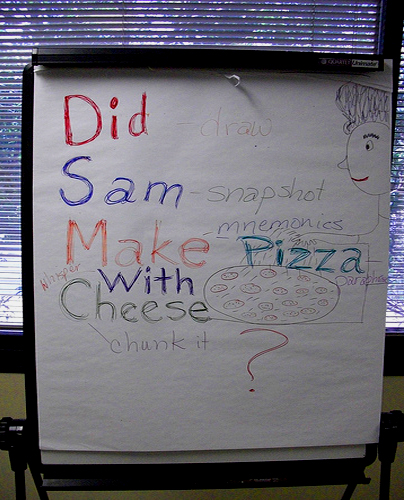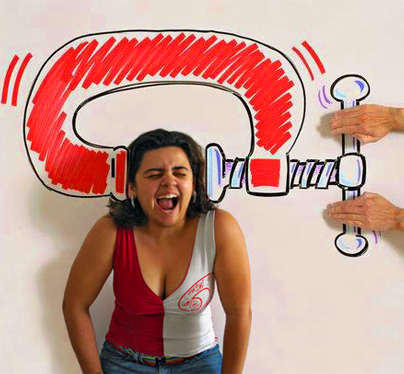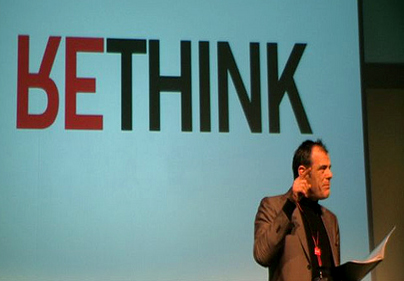
Have you ever wondered why it is impossible to remember what groceries you need without a list? Why is it musicians can remember the lyrics to hundreds of songs and are able to recite them on cue? If you were able to remember trivial details about the people you meet in your every day life it would make quite the impression on your colleagues, business associates and subordinates. In fact, Jesus Christ used the very technique of remembering the names and family and friends of his disciples. It is a winning way of influencing your friends and making them feel they are an important part of your life. Never again will you have that embarrassing moment at a party when someone who remembers you comes up and says your name, but you can’t say theirs.
The reason that musicians can remember the words to so many songs is that rhyming song lyrics work as mnemonic devices. They tap into our brain’s natural ability to use the power of rhyme as a memory tool. By saying the rhyming word we are more easily apt to remember the word which makes up the second half of the rhyme.
From the time that we are infants we are taught things through the power of rhyme. Some of the first things we learn as children are how to tie our shoes and do other every day things, and we learn to do them using mnemonic devices. Some of the most memorable children’s writings were by an author known as Dr. Suess. What made him so popular? His I-Can-Read books used familial rhyming schemes to help children anticipate what words would be coming next. This increased the confidence of children who read his now immortal writings. Many of his stories can be memorized and recalled word for word at the drop of a hat because they use the power of rhyme.
So what are Mnemonic Devices?

There are two basic types of mnemonic devices. There are those which use rhyme as a memory tool and there are those which use the first letter of each word to form an acronym. Acronyms are great memory tools which help you to remember anything from complex formulas to the answers to common trivia questions. If I were to ask you to name each and every color of the rainbow in the correct order, without using any form of mnemonic device, you would likely be hard pressed to come up with an answer in under 5 seconds. What if I told you that I can answer this without even having to think? What if I told you my five year old can name the colors of the rainbow in the correct order without even pausing to think?
It sounds amazing, but it is just the simple use of a mnemonic device which allows her and I to remember such trivial facts as the colors of the rainbow. The colors, in the correct order are Red, Orange, Yellow, Green, Blue, Indigo and Violet. Can you take a guess at how I recall this so easily? The answer is with a mnemonic device. In this case I have used an acronym to recall the fist letter of each color, since there are only so many colors in the spectrum, it is quite simple to deduce the names just by knowing the first letter. The acronym for memorizing the colors of the rainbow is: ROY G BIV. It sounds like an interesting name for a person. That is probably what makes it so easy to remember. It sounds like a very strange name, and we rarely forget the very strange. The cognitive power of your mind is not to be underestimated. You will be surprised at how little it takes for your mind to memorize anything and everything through the use of simple memory tools and mnemonic devices.
If you have ever learned to read music (and you really should learn to read music, it is a great way to exercise your mind) you are no doubt familiar with these devices. Mnemonic devices using acronyms are the same tools which music teachers use to teach their students the notes on the staff. Guitar teachers even use them to help their pupils memorize the notes on the open guitar strings with greater ease. Who can forget the simple devices for memorizing the bass and treble clefs on a musical staff? Every Good Boy Deserves Fudge and Good Boys Deserve Fudge Always.
Mnemonic devices are also frequently used as learning tools by math teachers. The method for memorizing Orders of operations in mathematics is BEDMAS, for Brackets, Exponents, Division, Multiplication, Addition, and Subtraction. In fact, many of the mnemonic devices we were taught in school are so memorable they have become tiresome and annoying. Who can type a word like conceive or receipt without remember the old “I before E, Except after C” a mnemonic device using rhyme.
If you have attempted to use the power of memorization to amaze and impress people but have been unsuccessful you are likely approaching it in the wrong manner. Many people use the approach of Rote Memorization which is a method a shocking your brain into memorization through the use of flash-cards or another quick question and quick answer method. Many people think they can use this hard-hitting method of improving their memory but it is actually highly ineffective.
Your brain uses a large portion of muscle memory in your day-to-day routine. This means that when you are going through a typical cycle your brain doesn’t have to work as hard and uses its’ muscle memory as something of a “cruise-control”. This is also called muscle retention, and it can be a good thing and a bad thing. Muscle retention can be built up and augmented. The result of this is your brain is operating at higher levels when it is in this cruise control mode. The brain is a glutton for punishment and your brain is challenged, it grows as does any other muscle. A common practice of body builders is to to “shock” their muscles in order to produce higher ranges of muscle memory and promoting more rapid muscle growth. This works with fantastic results for most muscles and it is the concept behind using flash-cards for memorizing mathematics. However, Rote-Memorization is highly unpleasant and does not produce results as effectively as mnemonic devices.
Using mnemonic devices establishes new neural pathways in your brain, which allows you to more quickly access information with almost no effort. Are minds are naturally attune to word play such as rhyme, homonyms, acronyms and other literary devices. Most of the information that we need to remember consists of arbitrary sequences such as phone numbers, postal codes, account numbers, first and last names, dates and years, all such boring combinations of data. The human brain more easily remembers information which is spatial or personal. we remember things that affect us because they are either surprising, humorous, sexual or provocative in some way. Mnemonics can be used to memorize entire lists of information or single important details such as what year the Bill of Rights was adopted by Congress. It is one of the first ways our mind learns to absorb and store vital information such as how to tie your shoes.
Examples of Mnemonic Devices
Memorizing the number of days in the months:
Thirty days hath September,
April, June, and November;
All the rest have thirty-one
Excepting February alone:
Which has twenty-eight, that’s fine,
Till leap year gives it twenty-nine.
When did Alaska and Hawaii become part of the United States?
the United States:
’59 was the date,
When Alaska and Hawaii became new states
Mnemonic Device for remembering the order of the planets:
My Very Educated Mother Just Served Us Nachos
Mercury, Venus, Earth, Mars, Jupiter, Saturn, Uranus, Neptune
How to memorize the signs of the zodiac:
he Ram, the Bull, the Heavenly Twins,
And next’ the Crab, the Lion shines,
The Virgin and the Scales.
The Scorpion, Archer, and the Goat,
The Man who holds the Watering Pot,
And Fish with glittering scales.
Advancing the power of your memory is one of the most important steps you can take in improving your mind power. Once it becomes effortless to recall information you will be able to impress and influence people with your amazing memory. Memorizing trivial details about your friends, all the important numbers and dates you need to know, the names and phone numbers of everyone you’ve ever met, and even important business information can be a great way to get ahead in many aspects of your life. Advanced memory is used by many mentalists and hypnosis experts as the basis of many of the psychic effects that we see created on television and in theaters and street performances. You too can master the power of your memory with mnemonic devices.





















